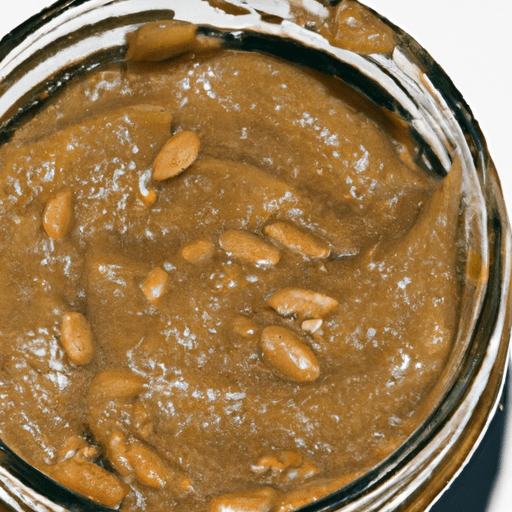Discovering the Golden Delight: Sunflower Butter
If you’re a fan of nut butters but looking to switch things up, let me introduce you to the golden delight that is sunflower butter. With its smooth texture, nutty flavor, and rich nutritional profile, sunflower butter is a versatile and delicious alternative that deserves a prominent place in every pantry.
Embracing the Nutty Goodness
Taste: Sunflower butter offers a unique flavor profile that combines earthiness with a subtle sweetness. It boasts a mild nuttiness reminiscent of sunflower seeds, making it a delightful ingredient in both savory and sweet dishes. You’ll also notice a subtle hint of roasted goodness that elevates its overall taste.
Common Uses: Sunflower butter can be used as a delightful spread, just like traditional nut butters. Whether slathered on a slice of toast, drizzled on pancakes, or incorporated into a sandwich, it adds a creamy and nutty kick to any dish. Additionally, it serves as an excellent substitute for peanut butter in baking recipes, smoothies, sauces, dressings, and even dairy-free ice creams. The possibilities are endless!
Nutritional Benefits Wrapped in Gold
While sunflower butter definitely shines in the flavor department, it also brings a host of nutritional benefits to the table:
Rich in Healthy Fats: Sunflower butter is a great source of healthy fats, including monounsaturated and polyunsaturated fats. These essential fats support heart health and help to reduce bad cholesterol levels.
Protein Powerhouse: In addition to healthy fats, sunflower butter is also a good source of plant-based protein, making it an excellent option for those following vegetarian or vegan diets. Protein is essential for muscle repair, growth, and overall cellular health.
Vitamin and Mineral Treasure: Sunflower butter is packed with vitamins and minerals, including vitamin E, magnesium, phosphorus, and selenium. Vitamin E, an antioxidant, helps protect the body’s cells from damage, while magnesium and phosphorus contribute to maintaining healthy bones and teeth. Selenium plays a crucial role in maintaining a healthy immune system.
Delving into the Sunflower’s History
Origins: Sunflowers, native to North America, have a rich history dating back over 3,000 years. Native American peoples cultivated sunflowers for their seeds, oils, and medicinal properties. These beautiful flowers were even utilized for ceremonial purposes.
Butter Evolution: The origins of sunflower butter can be traced back to the early 1980s when people started experimenting with alternative nut butters. Sunflower seeds, abundant and nutritious, emerged as an ideal substitute for those with nut allergies or dietary restrictions. Today, sunflower butter has gained popularity with its unique taste and remarkable versatility in the culinary world.
Fun Facts about Sunflower Butter
While sunflower seeds have been around for thousands of years, the production of sunflower butter didn’t become widespread until the early 2000s.
Sunflower butter is naturally gluten-free, making it an excellent choice for individuals with gluten sensitivities or celiac disease.
The cultivation of sunflowers spread beyond North America, and they are now cultivated in many parts of the world, including Russia, Ukraine, and Argentina.
Sunflower seeds are not only used to produce sunflower butter but are also a popular snack on their own, whether roasted, salted, or used in trail mix.
Adding Sunshine to Your Culinary Adventures
Now that you’ve learned about the wonders of sunflower butter, it’s time to bring its golden shine to your culinary adventures! Whether you’re looking to enhance your favorite sandwich, whip up a batch of irresistible cookies, or simply enjoy a spoonful of creamy goodness, sunflower butter is a true delight that will undoubtedly add a burst of flavor to your dishes.
So go ahead, embrace the versatility of sunflower butter and savor each moment as you dive into its nutty deliciousness. Let this golden delight brighten your recipes and bring a touch of sunshine to your life.
Sunflower Butter
Origin: Sunflower butter is made from sunflower seeds, which are the fruit of the sunflower plant (Helianthus annuus). The sunflower is native to North America and was cultivated by Native Americans as early as 3000 BCE.
Common Uses: Sunflower butter is a popular alternative to peanut butter for those with nut allergies, as it is nut-free. It has a smooth, creamy texture and a slightly sweet and nutty flavor. It can be used as a spread on toast, sandwiches, and bagels, or as an ingredient in recipes like energy bars, smoothies, and baked goods.
Nutritional Benefits: Sunflower butter is rich in nutrients. It is a good source of protein, healthy fats, and dietary fiber. It contains essential vitamins and minerals, including vitamin E, magnesium, and selenium. It is also naturally cholesterol-free and low in sodium.
Unique Properties: Sunflower butter is naturally gluten-free and vegan, making it a suitable option for individuals with dietary restrictions or preferences. It is also a versatile ingredient that can be used in both sweet and savory recipes.
Historical Significance: Sunflower seeds have a history of cultivation in different cultures. Native Americans used sunflowers for their seeds, oil, and as a dyeing agent. In the 16th century, Spanish explorers brought sunflowers to Europe, where they gained popularity as ornamental plants and as a sunflower oil source. Sunflower butter is a relatively recent creation, emerging as an alternative to peanut butter in the late 20th century to cater to individuals with peanut allergies.




Use the share button below if you liked it.
It makes me smile, when I see it.